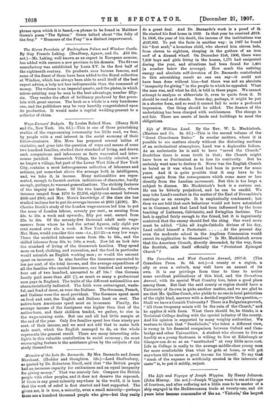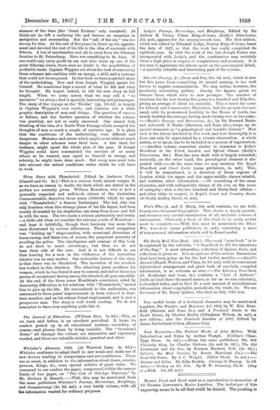The Life and Voyages of Joseph Wiggins. By Henry Johnson.
(John Murray. 15s. net.)—Joseph Wiggins went to sea at the age of fourteen, and after suffering not a little rose to be master of a ship engaged in the Mediterranean trade at twenty-one, and six years later became commander of the s.s. 'Victoria,' the largest steamer of the time (the Great Eastern' only excepted). At thirty-six he left a seafaring life and became an examiner in navigation and seamanship. But the " call of the sea " was too Strong for him. At the end of five years he threw up his appoint- ment and devoted the rest of his life to the idea of sea-trade with Siberia. A ton of merchandise cost £5 to carry from the Siberian frontier to St. Petersburg.- Here was something to be done. If one could only carry goods by sea and take them up one of the great Siberian rivers, there were no limits to the possibilities of profitable trade. Captain Wiggins set about the task of converting those schemes into realities with an energy, a skill, and a courage that could not be surpassed. In this book we have a spirited story of the undertaking. Now and then Joseph Wiggins speaks for himself. He sometimes kept a record of what ho did and what he thought. He hoped, indeed, to tell his own story at full length. When we come across what we may call a " we narrative " we always find it specially interesting and picturesque. The story of the voyage on the Nicolai ' (pp. 161-81) is largely in Captain Wiggins's own words, and contains not a little graphic description of men and things. The question of success or failure, and the further question of whether the scheme was practical, are not so easily answered. One cannot help thinking of the idea of a North-West Passage which occupied the thoughts of men so much a couple of centuries ago. It is plain that the conditions of the undertaking were difficult and dangerous. Mistakes and errors which might occur without much danger in other schemes were fatal here. A late start, for instance, might upset the whole plan of the year. If Joseph Wiggins could have commanded the services of as many others as he wanted, men equal to himself in energy and sobriety, he might have done much. But every man must take into account the actual conditions under which he will have to work.















































 Previous page
Previous page